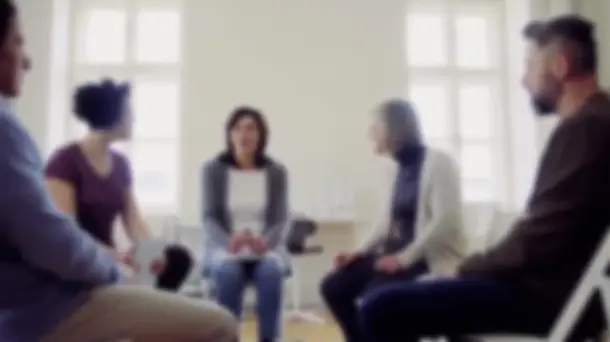Welcome to Narcotics Anonymous
What is our message? The message is that an addict, any addict, can stop using drugs, lose the desire to use, and find a new way to live. Our message is hope and the promise of freedom.

“When new members come to meetings, our sole interest is in their desire for freedom from active addiction and how we can be of help.”
It Works: How and Why, “Third Tradition”
Is NA for me?
This is a question every potential member must answer for themselves. Here are some recommended resources that may be helpful:
Need help for family or a friend?
NA meetings are run by and for addicts. If you're looking for help for a loved one, you can contact Narcotics Anonymous near you.
Subscribe to NAWS Emails
Sign up to receive Just for Today and SPAD daily meditation emails, as well as NAWS News, NAWS Updates, and more.
Never before have so many clean addicts, of their own choice and in free society, been able to meet where they please, to maintain their recovery in complete creative freedom.
Basic Text, “We Do Recover”
Recovery Quicklinks:
Service Quicklinks:
Narcotics Anonymous sprang from the Alcoholics Anonymous Program of the late 1940s, with meetings first emerging in the Los Angeles area of California, USA, in the early Fifties. The NA program started as a small US movement that has grown into one of the world's oldest and largest organizations of its type.
Today, Narcotics Anonymous is well established throughout much of the Americas, Western Europe, Australia, and New Zealand. Newly formed groups and NA communities are now scattered throughout the Indian subcontinent, Africa, East Asia, the Middle East, and Eastern Europe. Narcotics Anonymous books and information pamphlets are currently available in 49 languages.
Information About NA
Daily Meditations
Just for Today
August 11, 2025 |
Active listening |
| Page 233 |
| “Through active listening, we hear things that work for us.“ |
| Basic Text, pp. 106-107 |
| Most of us arrived in Narcotics Anonymous with a very poor ability to listen. But to take full advantage of “the therapeutic value of one addict helping another,” we must learn to listen actively. What is active listening for us? In meetings, it means we concentrate on what the speaker is sharing, while the speaker is sharing. We set aside our own thoughts and opinions until the meeting is over. That's when we sort through what we've heard to decide which ideas we want to use and which we want to explore further. We can apply our active listening skills in sponsorship, too. Newcomers often talk with us about some “major event” in their lives. While such events may not seem significant to us, they are to the newcomer who has little experience living life on life's terms. Our active listening helps us empathize with the feelings such events trigger in our sponsee's life. With that understanding, we have a better idea of what to share with them. The ability to listen actively was unknown to us in the isolation of our addiction. Today, this ability helps us actively engage with our recovery. Through active listening, we receive everything being offered us in NA, and we share fully with others the love and care we've been given. |
| Just for Today: I will strive to be an active listener. I will practice active listening when others share and when I share with others. |
A Spiritual Principle a Day
August 11, 2025 |
Harmony in Spite of Conflict |
| Page 231 |
| “When we practice living in harmony with our world, we become wiser about choosing our battles. We learn where we can use our energy to make a difference and where we need to let go.“ |
| Living Clean, Chapter 3, “Awakening to Our Spirituality” |
| Freedom of choice is a new concept for most of us in recovery. Recovery allows us to start to make healthy choices for ourselves and to consider the consequences of those choices for everyone involved. We begin to realize that we are not the center of the universe and strive to practice goodwill. Living in harmony with the world comes easily when our interactions with others are guided by mutual respect. We may be unaccustomed to disagreeing without being disagreeable, but we can see the benefits of this approach. When we're engaged with life, disagreements and conflicts come with the territory. In recovery, we learn to navigate confrontations differently than we had in the past. None of us gets clean to be a doormat, so we've got to learn to defend ourselves and fight for our passions in principled ways. With practice, we become less impulsive in our actions and take time to decide where we want to spend our energy. One member described how he questions his own thought process: “Am I championing this cause as a matter of principle or pride? Is this my battle, or do I need to let go?” We learn from our mistakes and those of others, and we consider the suggestions made by members of our support group more often. We grow to understand the preciousness of time. With only 24 hours in a day, we choose to find our way through conflict in ways that preserve our dignity and foster harmony. |
| ——— ——— ——— ——— ——— |
| I will take a deep breath as I decide how to spend my time and energy. Today I will choose responses that preserve my dignity and that of those around me. |
Do you need help with a drug problem?
“If you’re new to NA or planning to go to a Narcotics Anonymous meeting for the first time, it might be nice to know a little bit about what happens in our meetings. The information here is meant to give you an understanding of what we do when we come together to share recovery…”
Subscribe to NAWS Emails
Sign up to receive NAWS Updates and NAWS News emails as well as Just for Today and SPAD daily emails.



